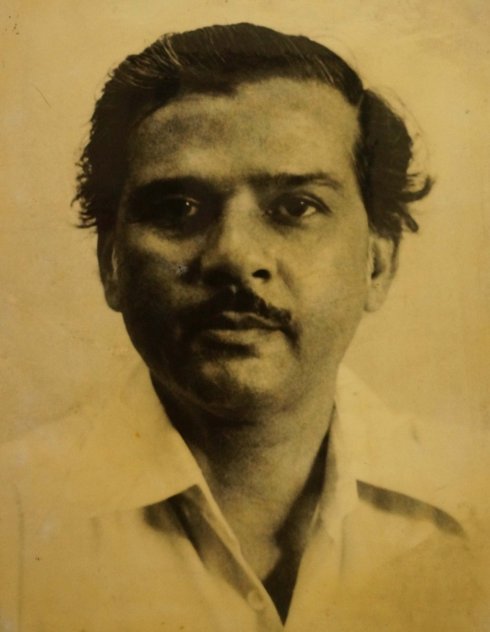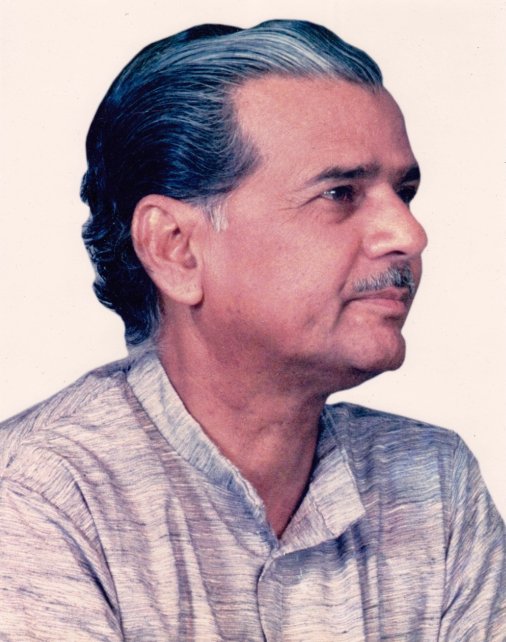 |
  |
 |
  |
Jiwan Pani - Surbhi Agarwal e-mail: surbhiagarwal252@gmail.com February 8, 2023 Born on February 13, 1933, Jiwan Pani belonged to a Brahmin family from Baripada in the Mayurbhanj district of Orissa. He was a scholar and a renowned poet, honoured with the Sahitya Akademi Award in 1996. After high school, he completed B.Sc with honours in Physics and a Master's in Education. Later, he appeared for Orissa Administrative Services (OAS). Among six sisters, he was the only son of Nakulcharan Pani and Chitra Mani Pani.  Jiwan Pani exhibited a keen interest in music, dance, and theatre since childhood. He also enjoyed playing the flute and cricket—besides, he cherished photography and cooking. At the age of thirteen, his first poem was published, which was widely applauded. He became a celebrated poet and lyricist whose art was sung by every common man. He was solely responsible for bringing forward the Orissa art aesthetics to the classical level. The paramount interest and versatility in every form of art left him no space untouched. He was conferred the Orissa Sangeet Natak Akademi Award for his outstanding study of the performing arts of Orissa. Some of his pioneering works include research studies on Chhau and Odissi dance forms, as well as puppets and masks of India. He wrote many songs which were later composed by Radhakrushno Bhanjo and his brother, Shantanu Mohapatra. In 1964, two of his songs from the film Arundhati- Aaji Mun Shraboni sung by Lata Mangeshkar and Mayuri Go Tuma, sung by Mohmmad Rafi became extremely famous and was credited with the utmost honour and popularity. Since then, his songs have been adopted by numerous filmmakers. Additionally, his theatrical and cinematic knowledge were exuded in his films on the Ravanachhaya, the shadow puppet theatre of Orissa, and video films on Mayurbhanj Chhau. His works have received critical acknowledgement and are a projection of his mastery of craftsmanship. In 1962, he got married to Reba Sarangi and had five children. In 1970, he came to Delhi and joined the Sangeet Natak Akademi. In the same year, he won a national award for his first documentary film on Chhau Nritya. In 1985, he became Director of Kathak Kendra, New Delhi, and he held the post until he retired in 1994. He was one of the most admired gurus. Eminent Indian classical dance guru Sonal Mansingh, wrote in his condolences in 1998, "Full of fresh ideas, ever enthusiastic to see, hear, and experience, wade into deep unknown waters where art and spirituality coalesced. Jivan-da remained humane, kind, elegant and helpful to a fault as following my example dancers of all hues demanded his time." Rooted in the treasure of Odiya literature and music traditions, Jiwan Pani has many publications that reflect his extensive interest and stature as a scholar, poet, lyricist, and perfect craftsman. He won the Sahitya Akademi Translation Award in 1996 for 'Muhan Sanjha', Malayalam to Odia translation of the famous book Ara Nazhika Neram authored by Parappurath (Kerala Sahitya Akademi Award winning novel, 1968).  Back to Roots: Essays on Performing Arts is a theme-wise compilation of Jiwan Pani's essays. The book reflects his various interests: the cult of Jagannatha; an individualistic and in-depth study of the Geeta Govinda; the Oriya systems of music as the third school, along with Carnatic and Hindustani; his numerous scripts for dance-dramas, tele-serials and films; and his deep study and understanding of Hindu and Buddhist systems of philosophy. This volume, sculpted with several photographs, celebrates his profound intelligence and fondness for the classical art form. It establishes his expertise that went into researching and deep understanding of the traditional Indian performing arts and Indian aesthetics. One of the prominent and influential poets and lyricists in Oriya, Jiwan Pani has also published a collection of poems in Oriya, a monograph on the Ravanachhaya, and another on the Purulia Chhau dance. His other publications include The World of Other Faces: The Masks of India ; The Living Dolls: The Story of Indian Puppetry ; and Celebration of Life: Folk Dances of India. His salutary contributions to the performing arts of India and Oriya translations hold significant importance for generations to come.  Surbhi Agarwal is a creative writer and a researcher. Responses * Thank you for writing such a beautiful article on my father. I am his fifth child. His original name was Jibanand Pani. When he came to Delhi to join Sangeet Natak Akademi, he was called Jiwan Pani. He used to joke around and say, “I left my Ananda in Orissa so now I am only Jiwan”. My bapa led a very saintly life and he passed away like a saint too! I still miss and remember his flute playing in the evening. I used to request him songs to play. (Sept 29, 2023) * I had the privilege of knowing him since my childhood and I have not come across any other such highly versatile person so far in my life. Pani uncle will live in our memories forever. - Sumit Mishra (Sept 29, 2023) * This story of Jeevan Pani by you is so illuminating! Though he is our very own hero in the field of culture, particularly Odia culture, I had little knowledge about him. I will certainly read your other essays in the blogspot. Thanks for your effort. - Somesh Mahapatra (Aug 30, 2023) Post your comments Please provide your name and email id along with your comment. All appropriate comments posted with name and email id in the blog will also be featured in the site. |